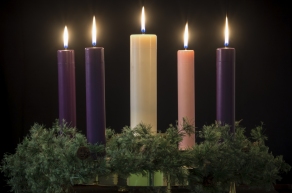
Depending on when you’re reading this, Lent has either begun or is a few days away. Perhaps it’s the readings, but at this time of year, I always reflect on my life and on the state of the world. I’m writing this blog on Sexagesima Sunday – a term that is a throwback to the 1928 Book of Common Prayer – denoting the second Sunday before Lent.
I rather like the old terms for these three Sundays (Septuagesima, Sexagesima, and Quinquagesima) because they give me time to transition from my Christmas and Epiphany mindset and prepare for Lent.
In some ways, they feel like the onramp to Lent, and, just like driving on a freeway, it’s best to come up to speed before you merge. I feel like I have a richer experience of Lent by observing these pre-Lenten Sundays.
Continue reading...

After his baptism and his vision quest in the desert, Jesus encountered crowds wherever he went. Dozens or hundreds of people turned up in every little town, desperate for healing for themselves or their loved ones. He saw families struggling to survive, kids who went to bed hungry, adults worn out trying to care for others. There were broken-hearted people, grieving painful losses, and many struggling to find or keep their faith, wondering where God was in the midst of their troubles.
Jesus was filled with compassion for all those people; his heart must have been breaking for them. How did he manage to stay open and present in the midst of all their suffering? We know that whenever he could, Jesus slipped away to spend time in prayer. He looked for quiet places where he could sit with the Creator and replenish his spirit.
Continue reading...

I’m not a big fan of January. Ever since I was a child, January has been my least favorite month of the year. I’m not quite sure why. I guess it has something to do with the weather and the general let-down that comes after the Christmas holidays. My father always insisted on taking down the Christmas tree on New Year’s Day which I found rather depressing. As an adult married couple, my wife and I much prefer to wait until January 6th or beyond to perform this least favorite task of the year. I am even intrigued by those cultures and traditions that keep the tree up until February 2, Candlemas Day but imagine the pine needles that would have to be cleaned up. Maybe my problem with January is also the frustration about New Year’s resolutions that go unfulfilled, although I have been sticking to my diet so far. It’s not that interesting and even enjoyable things don’t occur in January. Also, in January, the days start to become longer by one or two minutes each day which will be rather noticeable by the end of the month. Nonetheless, I know that when February 1st comes around, I will breathe a huge sigh of relief.
Continue reading...

I remember, before we had digital clocks, when our kids had to learn how to tell time. It was challenging at first, but soon they began to catch on. Then we could give them a watch and say, “Come home for dinner when the big hand is at the 12 and the little hand is at the 6.”
Those days are gone for good. Now we all have phones which display the time whenever we touch the screen. Wrist watches talk to us and preview our text messages and display video clips. But even with all this technology, do we really know what time it is?
I don’t mean confirming the exact hour and minute, but recognizing a turning point that really matters, in God’s time. When the Apostle Paul told us, “It is now the moment for you to wake from sleep,” he wasn’t foretelling what alarm clocks would do someday. “The night is far gone,” he wrote, “the day is near.” He meant that a new era is dawning, and we need to meet it with our eyes open. (Romans 13:11)
Continue reading...

When I first became conscious of Jesus as a small child, I did not think or feel uncomfortable about his appearance or skin color. Then, as I got older, it occurred to me that Jesus was not like me, especially blond, blue-eyed Jesus, the surfer Jesus. Dark brown-haired Jesus was more comforting, but he still did not look like me. As an adolescent beginning the socialization process, I recall feeling not okay as I became more conscious of my skin color. The message was that there was something wrong with me and my Native people, but I could not understand it.
This was a painful time, not only because Jesus was white, but because I was not, and the white people seemed to either agree with or be influenced by this reality. This judgmental attitude was usually displayed by nervous, uptight behavior when these folks were around me and my family. Then, as I got older, pictures of surfer dude Jesus really pissed me off! By this time, I was conscious of racism and its reality and painful effects. I became defensive about this and angry at white people for what they did to my people and continue to do, via their judgmental attitude towards us. I began to think that Jesus was only in existence for white people and not us people of color.
Continue reading...

As we prepare our Thanksgiving feasts and look forward to Christmas, we invite you to take the time to celebrate Advent. Advent can be a wonderful time to pause and reflect on the miracle that is to come. To help you celebrate this season, we’ve gathered a baker’s dozen of resources below. From all of us at ECF, we pray that your Advent is filled with peace, health and hopeful anticipation.
1. Find Advent and Christmas resources from The Episcopal Church here, including an updated Journeying the Way of Love Advent calendar and curriculum, weekly collects for Advent and Christmas Day, and Advent and Christmas Digital Invitation Kits. Most of their resources are also available in Spanish and French.
Continue reading...

Jesus was not a white guy. The paintings you may have seen, portraying him with sandy-colored hair and blue eyes, are figments of the European imagination. Jesus was a Palestinian, and he looked like one. If he were living in the U.S. today, we’d see him as a “person of color.”
That’s just the visual impression, though. In Jesus’ world, there was no such thing as a “nuclear family,” Mom, Dad and the kids. In those days, families were large and extended; kids growing up saw their aunts and uncles and cousins all the time. People didn’t move around if they could help it; local communities were close-knit.
Continue reading...

It’s okay to start backing off the Zoom live-feed and hybrid worship offerings. I remember the refrain, that we’re going to keep live-streaming until Jesus comes home. But now, as we enter a new phase of the pandemic (but still very much with Covid), I believe our opportunity is to reflect critically on our priorities and approach to community-building, especially double-check our use of technology and the goals we’re pursuing as the Body of Christ.
So here are some starter invitations, or questions as we find ourselves at the dawn of a new phase of the pandemic, still walking with Covid (and all those anxieties and opportunities that came along with it):
1. If you’ve got a live-stream team, celebrate them. Your folks who invested in that technology and designed amazing systems have met the future, and they deserve a great celebration. You may wish to ask them about their longer-term plans and thinking. They may have really good ideas about where to go from here. Some may sense it’s time to wrap up the ministry, or their part in helping that ministry. Celebrate them. All of them.
Continue reading...

On sabbatical this past spring, I walked to the village of Grantchester from Cambridge. Turns out, Grantchester is very much a real village, not just a lovely PBS series. “Go to the Blue Ball,” the docent at Kings College told me when I asked for directions; “that’s the best pub.” The walk was lovely, and the inn’s hospitality and lunch were spot on.
Walking out into the afternoon sun, I saw on the wall a cartoon drawn of some characters in the village circa 1980-something: there was the barman; and a number of other characters, some in business attire, some in work clothes; and then, near the center, was a balding man in a backwards collar on a black shirt: the vicar.
Continue reading...

We all love stories. Storytelling is imbedded in our DNA as human beings. Stories were used to explain the unexplainable—those mysteries such as birth, death, nature and the existence of a higher power or force, eventually described as God.
People of faith, or those who follow or practice a particular religious tradition are especially fond of stories. Jewish and Christian heritage and custom have been passed down to us through stories—about creation, sin, floods, slavery, freedom, laws, prophets, angels and, ultimately, redemption and resurrection.
While we love to tell stories, we also love to talk about ourselves, especially those qualities and experiences of which we are most proud. Telling our story is an essential element of the human experience and is the precursor to making connections, establishing relationships, and falling in love.
Continue reading...

The disciples had been watching their Master immersed in prayer, sitting in silence for long periods of time, and they’d learned not to interrupt. Jesus regularly went off by himself before the first light of day, seeking a deserted place to commune with the Creator. The disciples could feel the power of those times and yearned to experience that for themselves. “Lord,” they asked, “teach us to pray.” (Luke 11:1)
So Jesus gave them some words of prayer: calling on God’s Name, proclaiming the coming of a holy kingdom and their dependence on the Creator, seeking forgiveness “for we forgive everyone,” and asking for help when trials come. This simple version of the Lord’s Prayer (expanded in the Gospel of Matthew) has such an impact that we still say it today. It probably wasn’t new to the disciples—we can all use a reminder—but from their disappointed looks, something more was needed.
Continue reading...

As I write this blog I am in Abilene, Texas with my wife, Margaret, visiting our son David and his family – part of a month-long road trip during my six-week sabbatical. (David is Rector of the Church of the Heavenly Rest in the Diocese of Northwest Texas.) Our first stop from Connecticut was western Maryland, where Margaret’s brother hosted the annual family reunion followed by a visit with old friends from Hartford in Oklahoma. While there will be stops along the way, the next few weeks will include additional visits with family and friends in South Carolina and Virginia. All these summer gatherings continue to be wonderful opportunities for relaxation, refreshment, and reconnection.
Continue reading...

We live in a glut of information. Practically anyone can find any information or opinion that they wish if they put a few minutes of effort into it. As a result, people tend to mistrust scholarship. “I can think for myself!” is the constant refrain. Or, as I saw recently on Facebook, “We are all theologians by right of our baptism.”
In such a world, why on earth would I put the time, money, and effort into becoming a scholar? Why would anyone listen to a theologian?
The truth is: theological scholarship is so much more than just reading books.
Continue reading...

We all know that the past two years have been scary and difficult: the pandemic has been like nothing we’ve seen before. More than a million Americans have died, and all our lives have been turned upside-down. The death rate has been worse in the U.S. than in other similar countries, and surprisingly, the main reason is not medical care. Professor Robert Putnam of Harvard and his colleagues found a different explanation: that the levels of mutual trust and cooperation in our country have “rarely been lower” than they are today. (Time magazine, January 11, 2022, with reference to their recent book, The Upswing)
Continue reading...

When I arrived as the rector of the Episcopal Church of the Annunciation in 2014, there was one topic on the hearts and minds of many of the members. The original sanctuary built in 1970, which was converted into the Parish Hall in the early 1990s, was no longer meeting the needs of the congregation. It is too small to hold all of us at one time; we need a more functional kitchen both for our preschool and the church; and we want to add showers and laundry facilities, so it could serve as an emergency shelter when we experience extreme temperatures. Despite these identified needs, I kept coming back to the fact that it would be labor intensive and expensive, only to see the space stand empty most of the week.
Continue reading...

Jesus came to earth to live among us with his heart wide open. He came to love, because “God is love” (1 John 4:8) and “the Father and I are one.” (John 10:30) At the Last Supper he told his friends that “everyone will know that you are my disciples, if you have love for one another.”
Living so fully in love led to Jesus’ heart being broken, over and over. He saw children going hungry and elders being neglected. He saw people with disabilities banished from their communities and so-called “outsiders” demonized. He saw systems of power supported by violence, making a few people rich at the expense of many others. He knew that none of this was God’s will, and it broke his heart.
Jesus called his disciples to “be my witnesses…to the ends of the earth.” (Acts of the Apostles 1:8) That means that we, individually and as communities, should love as Jesus did. It means that when children in school or elders in a food store are gunned down by an assault rifle, our hearts will be broken. Again… and again… and again.
Continue reading...

Jesus was known for working miracles, right? The Gospels say he healed hundreds of people, fed huge crowds with just a little bread, walked on water and calmed a storm. Those “signs” made him stand out from other teachers and spiritual leaders.
For some reason, the Creator’s miracles don’t get as much attention. We often take for granted the way day follows night, the changing of the seasons, the cycles of birth and death and new life. Taken to an extreme, science can seem to reduce all of that to a mechanical system, meant to sustain its human operators. One of our most basic sins (meaning “separation from the Creator”) is acting like we’re in control of the world.
Continue reading...

As churches emerge from pandemic practices and take a fresh look at the way we used to do things, many are pondering what aspects of the past two years might carry over or influence our liturgies ahead. Some are committed to continuing worship online one way or another, some are challenged by the thought of returning to the common use of a common chalice. Some are wondering how they will exchange the Peace. The hand sanitizers that appeared in abundance in 2021 are sliding into the shadows. In all these things, the church is being given an invitation to enrich and expand its liturgical practices and understanding. Will we accept the invitation?
Ablutions, ceremonial washing of the priest and people, have been part of worship, or preparation for worship, for centuries. Jews, Christians, and Muslims, all have traditions of washing hands, face, and even feet, before prayer. Many Episcopal Churches maintain the ancient custom of keeping a bowl of baptismal water by the entrance to the church for people who want dip their fingers and sign themselves with the cross upon entering the nave. In addition to reminding worshippers of their baptism, this practice is a remnant of the medieval hand-washing before the Eucharist. Another tradition is the use of a lavabo bowl, held by an acolyte who then pours water over the celebrant’s fingers after the altar has been prepared and before the Eucharistic Prayer. Often, while engaging in this symbolic washing, the priest recites a verse from the psalms, “I wash my hands in innocence, and go around your altar, O Lord” (Psalm 26) or “Wash me thoroughly from my iniquity, and cleanse me from my sin.” (Psalm 51).
Continue reading...

“This can be the next rector’s problem,” I said to myself.
A silk dossal curtain hung behind the altar at Church of the Holy Communion in Memphis. It measured almost twenty feet tall and fourteen feet wide – a royal blue damask field with gold bands and appliqued image of the ascending Christ. Wippell made the curtain for us in the early 1950s, shortly after Holy Communion moved to its current site. The dossal presided over every Eucharist, offered hope at every funeral, and appeared in every wedding and graduation picture for three generations. But, it had begun to show its age: The fabric was threadbare and the porcelain tone of Jesus’ skin reflected the artistic sensibilities of a former age.
Continue reading...

My wife and I had the pleasure of spending Holy Week and Easter in Abilene, Texas, where our son, David, is rector of Church of the Heavenly Rest. In addition to spending delightful time with our three granddaughters, we attended multiple church services with moving liturgy, inspiring preaching, great music, and lots of people. Everyone seemed so happy to be together and, after two years, have “normal” celebrations. Due to the ruling of a federal judge, the mask mandate was lifted on our flight back to New York – yet another indication of normalcy.
Based on anecdotal evidence, it seems as though Heavenly Rest was not unique and that most Episcopal parishes enjoyed robust holiday services which has generated some excitement, enthusiasm and even optimism. Was this just an Easter “flash in the pan” or an indication of new vitality? Might this mean that the pandemic slump in church attendance is finally behind us, and people will be coming back to church as before? Might we even be turning a corner when it comes to numerical decline?
Continue reading...



















